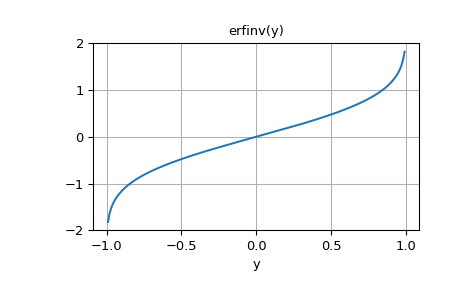scipy.special.erfinv — SciPy v1.16.0 Manual (original) (raw)
scipy.special.erfinv(y, out=None) = <ufunc 'erfinv'>#
Inverse of the error function.
Computes the inverse of the error function.
In the complex domain, there is no unique complex number w satisfying erf(w)=z. This indicates a true inverse function would be multivalued. When the domain restricts to the real, -1 < x < 1, there is a unique real number satisfying erf(erfinv(x)) = x.
Parameters:
yndarray
Argument at which to evaluate. Domain: [-1, 1]
outndarray, optional
Optional output array for the function values
Returns:
erfinvscalar or ndarray
The inverse of erf of y, element-wise
See also
Error function of a complex argument
Complementary error function, 1 - erf(x)
Inverse of the complementary error function
Notes
This function wraps the erf_inv routine from the Boost Math C++ library [1].
References
Examples
import numpy as np import matplotlib.pyplot as plt from scipy.special import erfinv, erf
erfinv(0.5) 0.4769362762044699
y = np.linspace(-1.0, 1.0, num=9) x = erfinv(y) x array([ -inf, -0.81341985, -0.47693628, -0.22531206, 0. , 0.22531206, 0.47693628, 0.81341985, inf])
Verify that erf(erfinv(y)) is y.
erf(x) array([-1. , -0.75, -0.5 , -0.25, 0. , 0.25, 0.5 , 0.75, 1. ])
Plot the function:
y = np.linspace(-1, 1, 200) fig, ax = plt.subplots() ax.plot(y, erfinv(y)) ax.grid(True) ax.set_xlabel('y') ax.set_title('erfinv(y)') plt.show()
